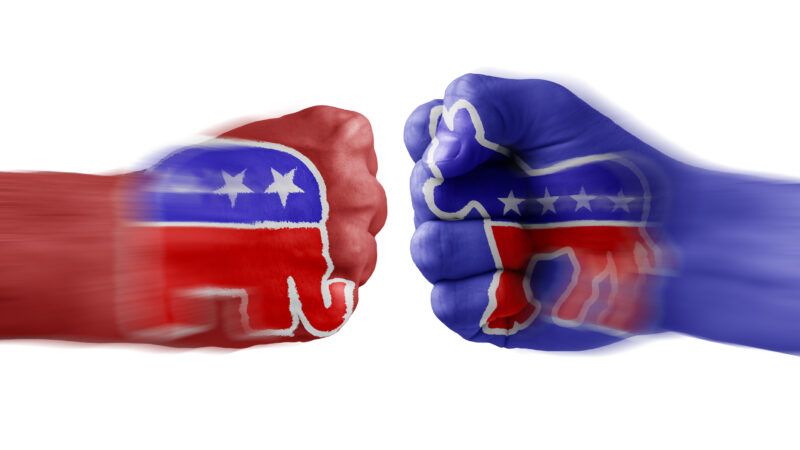70 Percent of Republicans and Democrats Agree: The Other Side Are 'Bullies'
A new poll from the University of Chicago's Institute of Politics found that 73 percent of Republicans and 74 percent of Democrats think the other side are authoritarian bullies.

Even in these polarized times, Americans from both parties can agree on one thing: The other side sucks!
A new poll of 1,000 registered voters published by the University of Chicago's Institute of Politics (IOP) found that 73 percent of Republicans think that "Democrats are generally bullies who want to impose their political beliefs on those who disagree." Low and behold, a near-identical 74 percent of Democrats think the same thing of Republicans.
The survey, conducted by pollsters Neil Newhouse and Joel Benenson in late May, likewise found that roughly equal proportions of Republicans and Democrats said that the other side was generally untruthful and spread misinformation.
"While we've documented for years the partisan polarization in the country, these poll results are perhaps the starkest evidence of the deep divisions in partisan attitudes rippling through the country," said Newhouse in a summary of the poll results.
So many people viewing the other side as contemptible bullies obviously isn't great. But it seems accurate enough. Republicans and Democrats alike are, in fact, quite eager to push their views onto people.
At some level, that's the entire point of being a member of a political party: to win elections so you can enact policies against the wishes of your losing opponents.
The IOP poll does, however, capture a regrettable backsliding in American society.
While bigotries one might have once had toward a neighbor of a different race, nationality, sexual orientation, or sect of Dutch Reform Church have subsided, heightened partisan tensions are helping us stay as angry as ever.
Indeed, partisan divides have been growing for nearly two decades now, to the point where they represent the primary fissure in American society.
"Partisanship continues to be the dividing line in the American public's political attitudes, far surpassing differences by age, race and ethnicity, gender, educational attainment, religious affiliation or other factors," noted a Pew Research brief from December 2019.
With emotions running high, it's no surprise that people act like bullies to their partisan adversaries. And it's led them to use the mechanisms of the state to push their views onto their losing partisan opponents.
Recall just last year, when Democratic states and cities required diners, theater goers, and students to be vaccinated, while Republicans proactively banned businesses from adopting their own private vaccine mandates. Political minorities in both red and blue states had every reason to feel pushed around.
One way of softening tensions is to sincerely try to convince people of your position and build large majorities in favor of major policy initiatives you try to enact. The patience our elected leaders have for doing that seems to be on the wane.
Witness the furious reaction from some Democrats at the U.S. Supreme Court striking down the Environmental Protection Agency's ability to unilaterally impose costly emissions regulations on power plants.
The Court's decision doesn't stop Democrats from passing identical rules through Congress. It just requires convincing some Republican elects to come along, or, failing that, some voters of the merits of those regulations. Instead, they've decided to fume like a smokestack about "fascist" judges destroying the planet.
Examples abound on the other side of the aisle too. Republican crusades against "critical race theory" in education have often tried to prohibit what ideas can be taught in private and charter schools as well, for instance.
The apathy about convincing people is evident in the IOP poll.
Half of respondents said that they've avoided political discussions with people because they were unsure of the other person's views. Another 40 percent have stopped following someone on social media because of their political views. One-quarter have said they've lost friends or avoided relatives over political differences.
You're obviously not going to convince someone of your views if you don't talk to them.
Not engaging with the other side while also pushing a proactive partisan agenda is obviously untenable. People will be increasingly correct in their perception that their opponents are trying to force views and policies upon them without their consent, or even their say.
Feeling threatened or inevitably triumphant, people also are more apt to resort to more bullying tactics. This makes dialoguing between opponents less likely. Rinse. Repeat.
One could try to break out of this cycle by adopting a more live-and-let-live, libertarian approach to politics, whereby people agree not to interfere in each other's lives and lifestyles nor ask for their own to be subsided or promoted by the state.
The eagerness with which people are disengaging with politics per the IOP poll shows that many people crave a little less partisan bickering in their lives.
If these same people applied a similarly apathetic ethos to public policy as well and stopped supporting politicians eager to control other people's lives, they might have less cause to hate and fear the other side.
Rent Free is a weekly newsletter from Christian Britschgi on urbanism and the fight for less regulation, more housing, more property rights, and more freedom in America's cities.


Show Comments (278)